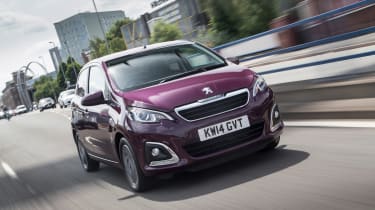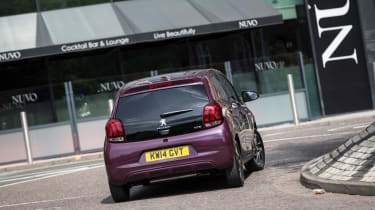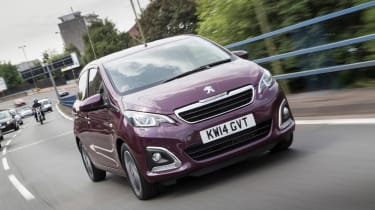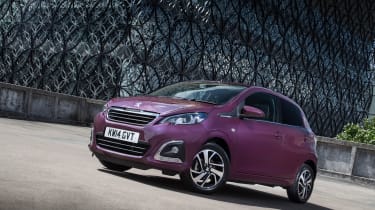Peugeot 108 review - can Peugeot's smallest raise a smile?
Peugeot's 108 city hatch has stiff competition against both its own siblings and the impressive VW Up
It’s not unusual for us in the evo office to be quite fond of the basic city car. Apart from being simple and somewhat authentic, the city car is quickly becoming a refuge of mechanical purity. Most do without complex gearboxes, many still avoid response-sapping turbochargers and, on paper at least, they sometimes even start to mimic the stats of our favourite historical hot hatches.
It doesn’t take much to get us on side then, so how does the Peugeot 108, driven here in GT-Line trim, get along? Well the first thing you need to know is that like the previous 107, the Peugeot 108 is built in the same factory alongside the Citroen C1 and Toyota Aygo. The three share pretty much everything from the chassis and powertrains to the interior. The two French versions even share bodywork from the A-pillar back, so how will the little Peugeot fare against its siblings and the rest of the class?
Peugeot 108 GT: in detail
Performance and 0-62mph time > Performance must be taken in context but even though the model we drove is the most powerful option, it isn't all that quick.
Engine and gearbox > Only available with three-cylinder engines paired to either a manual or semi-automatic transmission, the 108 reminds us of what cars used to feel like.
Ride and Handling > The Peugeot’s featherweight body is at the mercy of its basic core engineering. Ride quality is relatively resolved, handling less so.
MPG and running costs > This is where a city car makes a lot of sense; small engines mean big economy, and running costs are correspondingly low.
Interior and tech > Playing the minimalist game, the 108 and its relatives all share a pared-back interior brightened up with glossy finishes and bright colour options.
Design > Perhaps the most resolved of its chassis-mates, the 108 has a more grown-up appearance compared to the Toyota Aygo and blobby Citroen C1.
Prices, specs and rivals:
The Peugeot 108 starts at just £8,995, pocket change for a new car covered by the security of a warranty and low cost servicing, but start specifying items that should surely be standard equipment in 2017 like air-conditioning and a touchscreen infotainment system and you’ll quickly jump up and over the £10k mark.
The top spec GT-Line car we drove dramatically ups the level of standard equipment, adding a reversing camera, alloy wheels, keyless entry and start, front fog lights, leather seats and automatic climate control amongst others. The GT-Line also gets the more powerful 1.2-litre engine as standard, building on the standard 1-litre engine’s 68bhp to a peak of 81bhp.
> Click here for our review of the VW Up
The 108’s most obvious rivals are the Citroen C1 and Toyota Aygo mentioned previously. These offer very similar specification levels and features to one and other, although the Toyota does without the option of the more powerful 1.2-litre engine.
The Peugeot’s biggest threat lies in the Volkswagen Up and its derivatives. The slick German city car is exceptionally polished and even when in its Skoda Citigo or SEAT Mii forms, still exudes an Apple-like cool factor that remains strong some 6 years after its initial launch.







